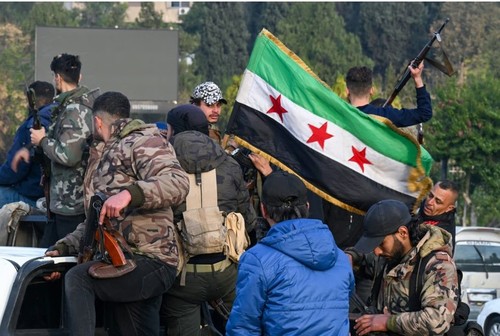 Syrian government forces collapsed quickly before the rebel attack. (Photo: AFP/VNA) Syrian government forces collapsed quickly before the rebel attack. (Photo: AFP/VNA) |
After years of covert preparation, the HTS forces in northern Syria launched a surprise offensive on November 27 against areas still controlled by Assad's government. Facing unexpectedly weak resistance from the Syrian army, the rebel forces captured a series of key cities within 10 days. On Sunday, they entered the capital Damascus and toppled the ruling regime.
An unexpected collapse
The rapid downfall of President Assad's government stunned observers, including Syria’s closest allies. During the 10-day offensive, the Syrian army offered little resistance, except for initial clashes around Aleppo, Syria’s second-largest city. Following the collapse of Aleppo on November 30, other strategic cities, including Hama and Homs, quickly fell, paving the way for HTS to seize Damascus with little bloodshed.
According to observers, the weak resistance and the rapid fall of Assad’s regime was due to several factors. The HTS offensive took place at a time when the balance of power in the Middle East has been shifting dramatically. Hezbollah, a Lebanese militia that has supported Assad’s government, suffered significant losses in several months of renewed fighting with Israel, while Iran, another key ally, is close to triggering a full-scale war with Israel and must act cautiously.
Russia, another key ally of Syria, preoccupied with its military engagement in Ukraine, has been unable to provide substantial assistance to the Syrian army, apart from the limited air support offered by its small contingent at the Hmeimim base in Syria. Consequently, President Assad’s government was short of significant military and security support.
Additionally, after 13 years of civil war, Syria’s economy is in ruins, and its troops are demoralized and depleted. Millions have died in the conflict, leaving the country’s armed forces without the strength or motivation to continue fighting.
Ibrahim Al-Assil, a senior fellow at the Middle East Institute in Washington, D.C, said: "I think another crucial factor of why Hayat Tahrir Al-Sham was able to push against the Syrian forces is that they have a goal which lacks or when we talk about the Syrian forces, they lack a clear goal of why they are still fighting this war."
The Syrian people received the political upheaval with relative calm. Following HTS's entry into Damascus, order has largely been maintained.
Haid Haid, an expert at the UK Chatham House’s Middle East and North Africa Program, said: "For the first time now there’s actually the possibility that what must come next could be better than today. For sure, there’s a risk that could be worse but for the first time there’s more than one possibility."
Global implications
The political upheaval in Syria will have far-reaching consequences for the Middle East and the world because of Syria’s pivotal geopolitical position and the intricate web of security dynamics involving internal factions and external players. Analysts and observers still have limited information about the HTS group. Middle East expert Ibrahim Al-Assil said HTS originated from Jabhat al-Nusra, the Syrian branch of Al-Qaeda. However, since 2017, HTS has made a substantial shift away from extremist ideology and has expressed a desire to build a modern Islamic society rather than adhering strictly to traditional doctrines.
HTS's recent declarations of being open to power-sharing with other Syrian factions and maintaining communication with the Bashar al-Assad government have been seen as a positive development. Nevertheless, Al-Assil cautioned that evaluations of HTS should be based on its future actions.
Qutaiba Idlbi, a Syria expert with American think tank Atlantic Council, said the regional impact of Syria's political transformation will be determined in the next few months, as forces in Syria negotiate the details of the country’s transition. Idlbi also addressed potential US involvement.
He said that for the US, at least there’s no strategic interest for the US and Syria rather than preventing refugees and preventing Iranian activities. Beyond that there’s no interest from Washington to dictate what the shape of next Syria would be, said Idlbi.
Several nations have expressed a willingness to help Syria develop a comprehensive transition plan. At the Doha Forum on Sunday, UN Special Envoy for Syria Geir Pedersen said that despite the immense challenge of rebuilding a fractured and war-torn Syria, the international community should seize this opportunity to foster unity.
"The challenges ahead remain immense. And we hear those who are anxious and apprehensive. Yet this is the moment to embrace the possibility for renewal in Syria. The resilience of the Syrian people has brought forward to united and peaceful Syria," said Pedersen.
In its first proposal, the Syrian National Coalition, an umbrella organization representing the country's external political opposition, on Sunday proposed an 18-month transition period to draft a new constitution and hold general elections. HTS and other domestic factions have yet to respond to this proposal.